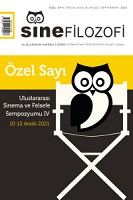Douglas Sirk Sinemasında Moral Ökült ve Maniheizm
Moral Occult and Manicheism in the Cinema of Douglas Sirk
Author(s): Sercan BozdoğanSubject(s): Aesthetics, Philosophy of Religion, Film / Cinema / Cinematography, Sociology of Art, Sociology of Religion, History of Art
Published by: Serdar Öztürk
Keywords: Moral Occult; Manicheism; Melodrama; Douglas Sirk; Peter Brooks;
Summary/Abstract: Moral Occult and Manicheism are the most important concepts that form melodramatic mode. The concept of Moral Occult is based on moral norms which are transformed with the transfer of the traditions from one generation to another. Likewise, the concept of Manicheism is based on various religious practices forming the belief that names itself. Movies, in which melodramatic mode takes place, has universalized in time and are still getting great attention from the audience. Behind this attraction lies the primitive society mindset and the connection between the concepts of Moral Occult and Manicheism. Movies of Douglas Sirk are the representatives of melodramatic mode in cinema. Magnificent Obsession (1954), All That Heaven Allows (1955), Written on the Wind (1956), Imitation of Life (1959), all of which can be said to have marked the 1950s, stand out with the Moral Occult and Manicheist themes. By bearing in mind that the moral principles, emerging as an outcome of the continuity of primitive societies’ traditions, turn into religions afterwards, the aim of this study is to look at the origin that forms the Moral Occult and Manicheism concepts. By benefitting from cultural anthropology and theology that form the origin of Moral Occult and Manicheism, the reason why melodrama is so popular with the audience will be explained through the readings of four films by Douglas Sirk.
Journal: SineFilozofi
- Issue Year: 7/2022
- Issue No: Sp. Iss.
- Page Range: 41-54
- Page Count: 14
- Language: Turkish

